Schools will need to iron out a lot of details. If services are missed, the U.S. Department of Education says IEP teams must consider make up or “compensatory” services.
Andrew M.I. Lee, JD editor of Understood and former attorney who strives to help people understand complex legal, education, and parenting issues
Lindsay Jones, JD chief executive officer of the National Center for Learning Disabilities (NCLD)
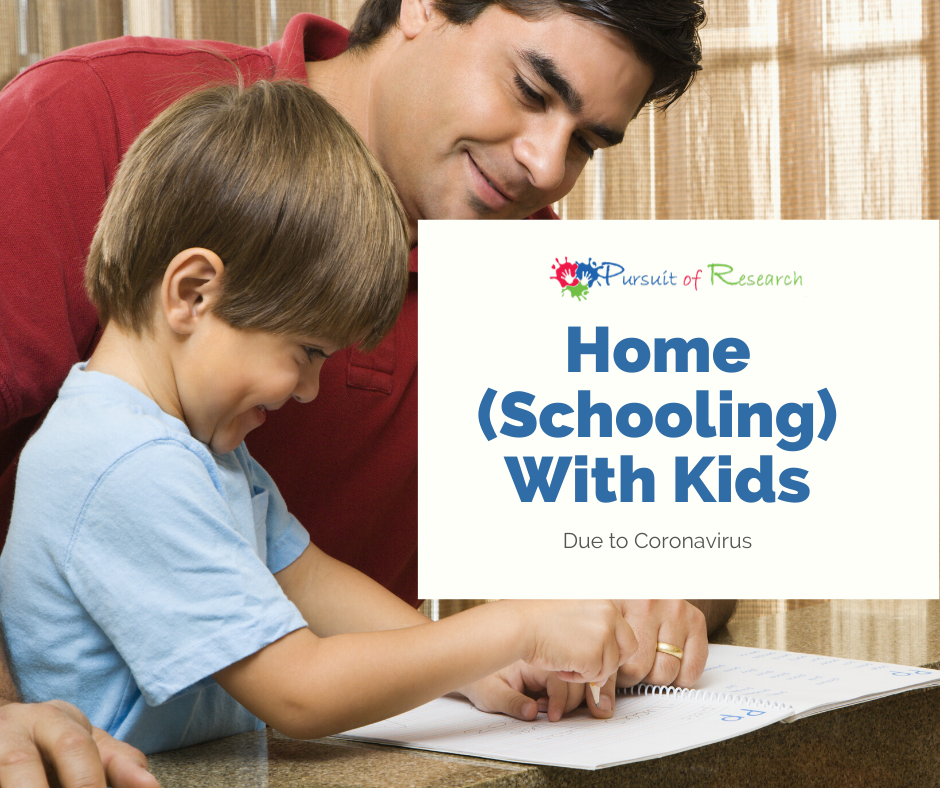
School’s out and not just for a snow day or the summer, but for the first time for probably just about all of us due to a pandemic; specifically coronavirus (COVID-19). Without knowing how long this will go on there are questions regarding what to do during this hiatus (outside of searching for toilet paper, or trying to make your own hand sanitizer) As stressful enough as a pandemic is for all, when there are special needs children there are added concerns about therapy and what can you do at home to help with learning and therapy, or even just fun things to do in the downtime! Here are some suggestions.
Keep A Routine
Experts agree the best way to keep children on track is to put your children on a schedule and stick to it. After getting up, taking a shower and getting dressed just as they would on a typical school day plan your day to include meals, education both what the school sends home as well as what you can find online, downtime which can include technology, home “gym class” which could involve dancing, a pillow fight, going for a hike, and speech therapy (you hopefully get some homework from your child’s SLP) Here is a sample schedule you can customize for your child.
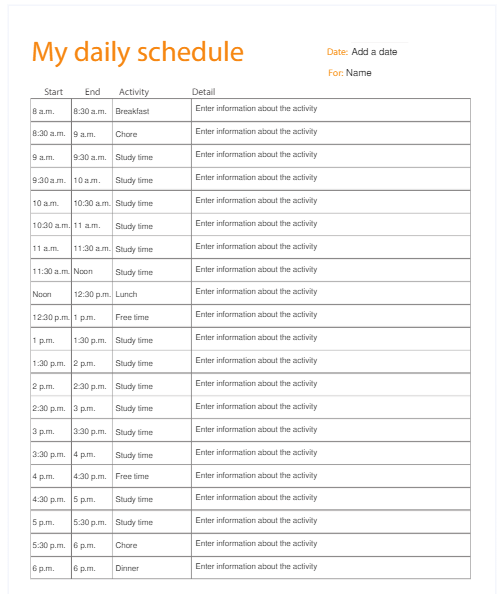
You can purchase a large calendar along with some stickers or markers that you and your child can keep track of the dates and times. It doesn’t have to be perfect or fancy. Here is one example shared on CNBC
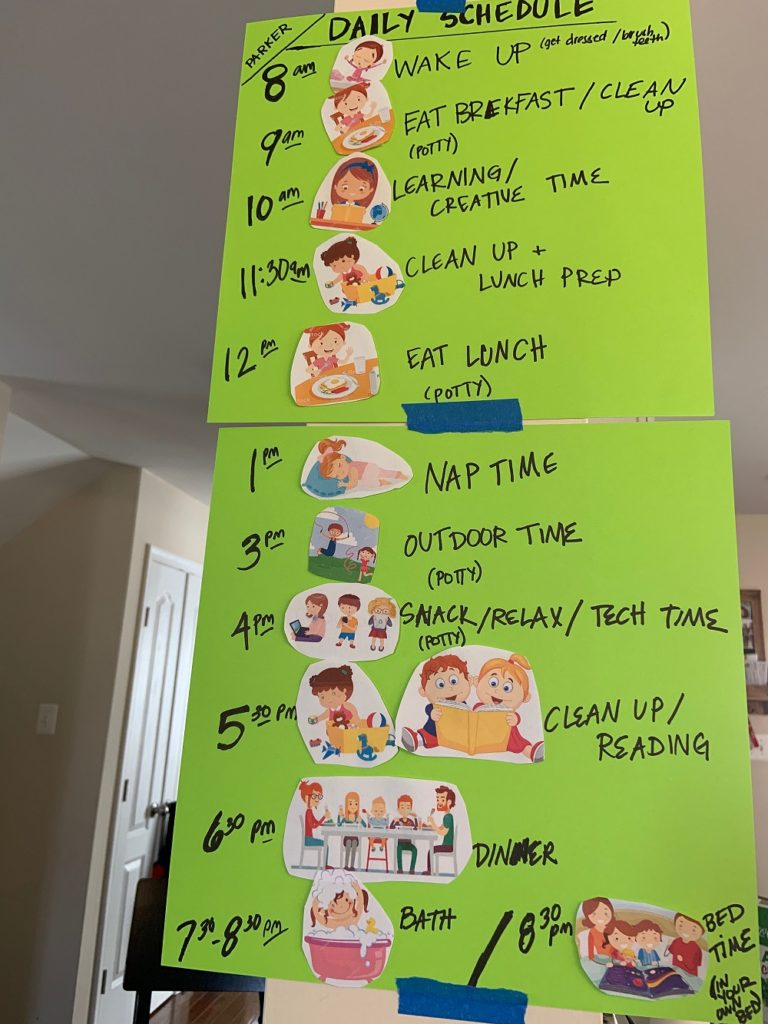
With children, a change in their regular routine can make a huge difference. It can even take a week for children to get used to the changes with daylight savings time, so be patient with them, and with yourself. Unless you were already homeschooling, much of this is new territory.
Why It’s Smart That School Is Out
If you are wondering why the schools are closed, please read this information with quotes from medical experts to learn how this will help your children as well as others.
Therapy
Check with your child’s SLPs for homework and activities they recommend. While there are numerous blogs, videos, and articles online for therapies, going weeks or even months without appropriate therapy may be detrimental for children who require intensive, frequent therapy. For this reason, through the Cherab Foundation, we will see if some SLPs would like to share videos and articles for general speech therapy activities parents can do at home while school is out.
For preschool children who are late talkers or who have a speech impairment, this is something I wrote for Contemporary Pediatrics.
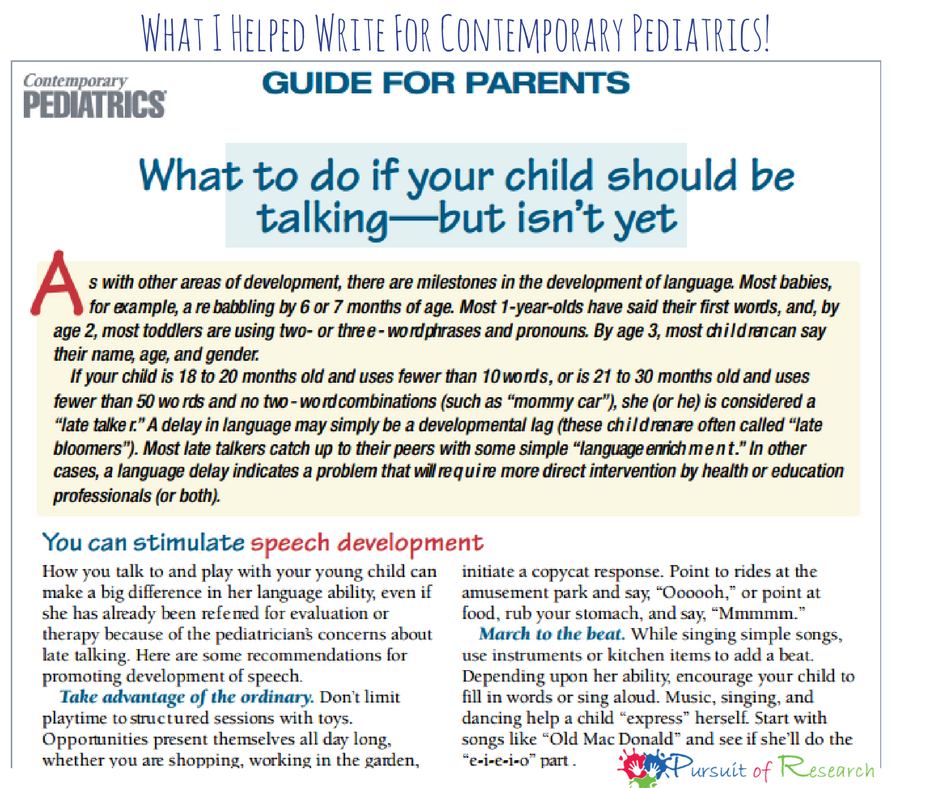
From Understood it appears everyone is still trying to figure this out -something will be put in place to get your child therapy
If schools close, but they decide to have all kids learn at home, are schools still required to provide special education?
Yes. Kids with disabilities have the right to a free appropriate public education. If a state or school district decides that all students must be taught at home for public safety, it must have a plan for special education services.
Many states are already putting these plans in place. They will also need to plan for how kids can use accommodations or get equal access if learning is online or at home.
If all kids are learning at home, what happens to special instruction or related services in a child’s IEP?
We don’t know all the details yet. In its legal guidance, the U.S. Department of Education says schools must “make every effort to provide special education and related services” to students. But it notes that there could be “exceptional circumstances” that change how services take place.
Many IEP services are provided one-on-one or in small groups. For example, a student’s IEP might require 30 minutes of occupational therapy. How will the school deliver this? Will there be enough staff to send someone to every family’s home? Will parents want visitors?
Schools will need to iron out a lot of details. If services are missed, the U.S. Department of Education says IEP teams must consider make up or “compensatory” services.
As schools continue to manage coronavirus, there may be situations where families and schools disagree. Despite any differences, it’s important to work together in collaboration to make sure everyone stays safe and that kids get the services they need. Join the Cherab Foundation support group on Facebook to learn more.
School or Homeschooling Resources
Many school districts across the country are going digital and sending lessons home via the web, even providing students with chrome books that don’t have them. In other cases, parents are on their own with their children. In both cases, you can look to resources utilized by those that homeschool their children. Pardon the pun, but do your homework here as some are always free such as those shared by this blogger. During the coronavirus, there is a list of educational companies offering free services. Here are some free educational programs offered to help you through this pandemic.
Here is a list of more places to find a curriculum suited to your child’s age and grade. Again some are waiving their charge during this pandemic so check the Amazing Educational Resources Facebook group to learn more.
If you want to try a homeschooler’s resource, Time4Learning which appears to have good reviews. (we can’t personally tell you which of these programs are best. Also, if you do decide to purchase a program we link to we have no affiliation with any that are linked to in this article. Sharing for support.)
ABC Mouse provides a complete curriculum for children ages 2 to 8.
For 8 to 13 year old children, from the makers of ABC Mouse, there is Adventure Academy.
For schools not yet shifted online during the coronavirus hiatus, here is a list of 37 free educational platforms that you can share with your school district/PTA/children’s teacher to see if something can be started.
Playdates…Perhaps
If you have more than one child they can play with each other, but children regardless will want to get together with friends. Some medical doctors aren’t as concerned about small playdates of two or three children, as long as you know the child and family and can be assured they have had no cold or flu symptoms (early coronavirus symptoms often appear like colds or flu) while others disagree stating symptoms can be too mild to detect.
This quote from a Washington Post article outlines the confusion about playdates even amongst medical professionals while shedding light on perhaps whey they should be on hold for now.
“For Maha Mahdavinia, a physician in allergy and immunology at Rush University Medical Center, this probably means no more play dates for her 9-year-old and 6-year-old, who won’t be in school. She had been considering letting them have up to three friends at a time in the house, but after watching things unfold in Italy and now that she has a positive case in her ICU, she is leaning against it. “It’s a disaster, and children are in the mode of transferring it now.”
Please read why it’s important you are diligent about keeping children safe from coronavirus here
If you do decide on letting your children have a playdate these are the recommendations from the experts:
- Play outside in the yard.
- Have kids wash their hands for 20 seconds or use hand sanitizer.
- Consider activities like biking or hiking where everyone is separate.
- Avoid places like malls and movie theaters
- Avoid public playground equipment that has been touched by numerous children, some who may not have the best hygiene.
If you do decide to have a playdate inside, remind your children not to touch their faces and to wash their hands. Use bleach wipes on every surface you can think of that kids will touch — wall and light switches and doorknobs, toilet handles and lids, all sorts of toys, and of course any video game controllers or other devices, including TV remotes. Wipe them all again after the other kids have gone home. As parents, if we don’t take social distancing seriously and curb face-to-face interaction, we defeat the purpose of closing schools and workplaces. #flattenthecurve
Crafts and Other Scheduled Fun Time Activities
PINTEREST. Need we say more? You’ve been pinning creative, fun crafts and activities to do with your children for years. NOW is the rainy day (weeks, months?!) you’ve been waiting for to check them out! If you are not on Pinterest and have no idea what we’re talking about -here are a few of my boards to get you started:
Educational Fun Activities
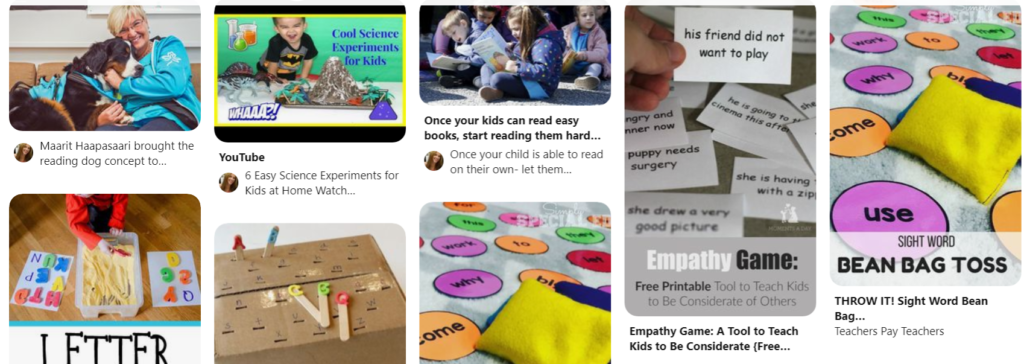
Fun Activities For Kids
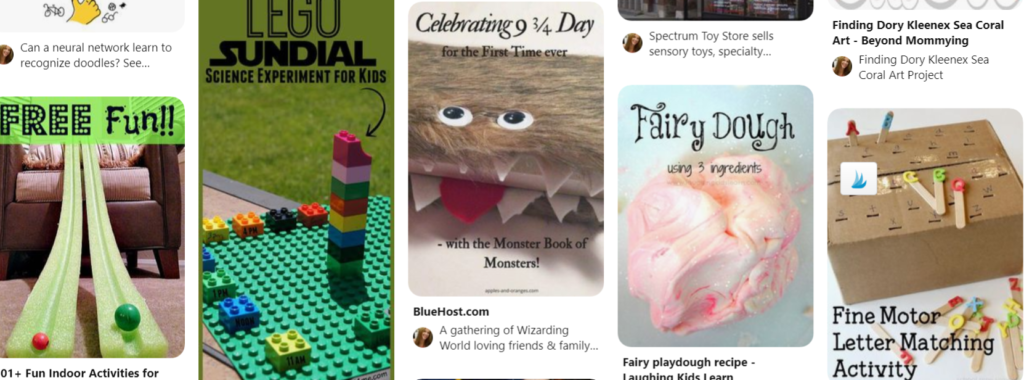
Watch Documentaries Together
Now probably isn’t a good time to cut screen time for your children. Why not catch up on some documentaries that are both entertaining and educational with your children? Here are some documentaries approved for kids by CommonSenseMedia.
More Creative Ideas For Kids
Start compiling items like sensory bins for younger children and put together baskets full of activity books and games for older children. Take an afternoon and head to the dollar store and grab things that look like they’ll be of interest. Place some of the items on a table and let your child naturally start exploring it (which also gives you time to get things done!) Here is an example with toddlers.
More suggestions from the Washington Post and HuffPost
- “My kids will do anything for a dollar,” she said. Chores, laps around the house, helping a sibling with homework — it can all take up a lot of time, and they earn their keep in the meantime.
- From Valerie Ritchie, a parent coach and psychologist in the Netherlands: theme days, like Lego day, where you dump all your pieces on a table and have at it; mealtime planning, where each child gets one evening to come up with and prepare (with help) the meal and, more important, the dessert; audiobooks; sports competitions outside, preferably with as little contact as possible, or siblings only.
- From Brent Curran, who is working at home alongside his wife and has an eighth-grader and a fifth-grader who are distance-learning: “Being deliberate about physical activity has helped us all,” he wrote in an email to On Parenting. So this is a good time to go on a hike, a nature scavenger hunt, a walk around town (avoiding people!), have the kids create an obstacle course or even find the joy of sidewalk chalk.
- From Emily Prucha, an English teacher in Prague who has three children home from school: Two boys spent a good portion of a day creating a movie with the iMovie app on their phones. She stocked up on ingredients, so now they have been cooking and baking. (Minute Mug Cakes are her daughter’s favorites.) She has a game cabinet that has not been touched in a long time and is being rediscovered. They live near woods and spend a lot of time on “adventure walks.” They aren’t going to movie theaters, so her children set up a theater in their house, with popcorn and chocolate. And they talk to their grandparents and friends in the United States via Skype. (Speaking of which, don’t forget to call the people in your lives who really may be feeling isolated now. Who doesn’t love to talk to kids? And those calls can take up a good amount of time, giving you a break that you may need.)
- “I have to work from home, so I need to build in independent study blocks for my 8-year-old. So far it’s been Lego building challenges, researching artists and making art in their style, and reading. We are moving into week 4 at home (thanks to the flu, then a tornado before all this), so I need to focus on grade-level curriculum a bit more now.” ― Brittany Rtg
- “In terms of apps, Khan Academy Kids is often educator-recommended and an excellent learning tool. Very diverse offerings. And a good fit for child-directed learning for parents juggling work from home.” ― LM Brash
- “My kids look forward to Easter season every year. I fill plastic Easter eggs with battery-operated tea lights (get the ones with on/off switch for safety reasons with children under 4) and we do glow-in-the-dark egg hunts every night. This is the perfect way to get the kids to clean up all the toys since you can’t hunt in the dark with toys all over the floor. We count the eggs, talk about why some eggs glow brighter than others, etc.” ― Christie Pham
- “The best thing is to remember you’re their parent who is teaching them, not just a teacher. It’s easy to get overwhelmed or frustrated, but how you speak to your child will become their inner voice. There are so many ways to help your kiddo available even from the confines of home. Take a break when you get stressed and be silly for a few mins. You’d be surprised that your child might learn from you in just a few weeks something they’ve been struggling with all year.” ― Andrea Stewart Williams
- “Go on a nature scavenger hunt in the yard or at a park. I write a quick list of 10 items to find ― for example, ‘something soft,’ ‘something with spots,’ ‘something round,’ ‘something yellow,’ etc. ― on a paper sack.” ― Kelly Holt Nelms
- “Virtual museum visit with the kids! And use coloring supplies to be inspired into making your own art.” ― Belle Regeer
- “I homeschooled my oldest. This is a good chance to show your kids why you need math. Do a recipe to teach measurements, cut it in half or double it to do fractions. We used mail for quick reading, sentence fragmenting. Examine or critique a TV show or movie. What was the theme? Turning point? Use imagination going through your day.” ― Linda Abbott
- “Reading, baking, Play-Doh, sand play and Legos are favorites in our house.
- Get outdoors for nature walks/scavenger hunts. Bring paper and crayons and make leaf rubbings, etc. Collect different types of flowers, leaves, and Google them at home. YouTube is great for things like jolly phonics, yoga videos and dance videos.” ― Michelle Bosonnett
- “We play store with real coins. We do art “challenges,” coloring and talk about our work. We bake. We explore our yard, weeding (free labor) to look at roots and bugs. And sometimes we take out a workbook. And they learn by playing pretend, by watching mom do chores (like cleaning toilets when they’re in the bath!) and helping out. By organizing a shelf or helping with dinner. It all works, but the day is LONG. So we also watch TV, play cards, use our tablets mindlessly, and eat candy. And there’s yelling and pushing, etc. too!!!” ― Jessica Starace
- “For teens, I am considering having them watch a movie a day that focuses on history or gives a perspective of certain times in American history. For example, ‘Good Morning Vietnam,’ ‘Forrest Gump’ — I’m open to other suggestions for movies.” ― Amy Bashian McCoy
- “We love podcasts and will be listening to more for sure! Currently loving: ‘Wow in the World’ (science), ‘The Past and the Curious,’ ‘What if World’ (silly stories), ‘Noodle Loaf.’” ― Elizabeth Telmosse
- “I told my daughter who is almost 13 that the next three weeks are a golden opportunity (the silver lining, if you will) to explore her personal interests and hobbies. When else will she have three weeks of time to make a vision board, work on her sewing skills, read things of interest to her and work on the website she wants to build for the business she wants create? Self-study can be an invaluable tool for helping kids grow as individuals, just as much as academic tools can. Plus, it is building resourcefulness and creativity instead of being glued to a device and consuming content created by other people.” ― Gaynor Hardy Meilke
- “Take making slime a step further by teaching about polymers.” ― Whitney Cornelison
- “Education.com has so many free worksheets/booklets that can be printed! We use them at home with our 4-year-old on days he doesn’t have preschool. Also — survival mode. Understand that keeping them engaged all day is hard. There will be movies, TV, iPad time, etc.” ― Brittney Vachon
- “We are making photo books online — we have so many photos we never printed, so each kid is going to sift through our photos online and put together their own book that we will then have printed and sent to us.” ― Melinda Catherine
- “Sensory-based activities, like drawing numbers, letters and words in sand and flour, salt dough, obstacle courses, forts, vinegar-and-baking soda volcanoes.” ― Rachel Dinnen
- “The IEL – Illinois Early Learning Project has developed a resource list on routines and guidance, explaining the situation to young children, and developmentally appropriate activities for young children.” ― Jill Theobald Tompkins
- “Educational games! There are tons of geography and math games. Quiddler is our favorite word game.” ― Laurie Sumner Oldham
- “Board games are also a fun way to learn. Here are some of our favorites (this doesn’t include games like Candyland or Monopoly). … My kids love doing easy science experiments. I put together a list of fun science activities that are easy to do at home.” ― Darcy Zalewski
- “Scholastic launched a free online program. I use Readworks, which is also free.” ― Shelley Ullman
- “Scour your bookshelves; there’s valuable information to be had. Many children’s books offer activities and ideas for keeping the learning going at home. Here are a few ideas from books that may already be on your bookshelves.” ―Marie Bentley Shaurette
- “Cosmic kids yoga on YouTube.” ― Kristen Fritz Peterson
- “This is a project our homeschooling family has been working on for a while. The aim is to teach children global citizenship and empathy.” ― Janine Berger
- “Teacherspayteachers.com has tons of great learning activities and games you can print and use at home.” ― Chelsea Mackey
- “Watching movies on Disney+ while you’re on a phone call? No worries! Here are some fun crafts to make after the movie.” ― Whitney Cornelison
- “Tons of great ideas for homeschooling here, with lots of printable activities and worksheets for kids.” ― Katie Reed
- “We play with Lego bricks. There are a ton of cool activities to do with six bricks.” ― Mélanie Cumbo
Stay Clean
Before eating, after outdoor activities, and a few times in between have your children wash their hands for 20 seconds with soap and water. You can do it together and make a game of it by singing the ABCs. Like everyone today unless you already have it you probably will have a difficult time finding any hand sanitizer in the stores, and please don’t try to make your own as it may not be healthy for the reasons this article shares. Experts agree hand washing is better anyway.
Stay Calm
Stay safe, stay well, stay calm, and if you or your child do feel ill, stay home. We’ll get through this. As special needs parents, we’re more prepared to handle a challenge than the average bear.
LISA GENG
Author and President of The Cherab Foundation
Lisa Geng is an accomplished author, mother, founder, and president of the CHERAB Foundation. She is a patented inventor and creator in the fashion, toy, and film industries. After the early diagnosis of her two young children with severe apraxia, hypotonia, sensory processing disorder, ADHD, and CAPD, she dedicated her life to nonprofit work and pilot studies. Lisa is the co-author of the highly acclaimed book “The Late Talker” (St Martin’s Press 2003). She has hosted numerous conferences, including one overseen by a medical director from the NIH for her protocol using fish oils as a therapeutic intervention. Lisa currently holds four patents and patents pending on a nutritional composition. She is a co-author of a study that used her proprietary nutritional composition published in a National Institute of Health-based, peer-reviewed medical journal.
Additionally, Lisa has been serving as an AAN Immunization Panel parent advocate since 2015 and is a member of CUE through Cochrane US. Currently working on her second book, “The Late Talker Grows Up,” she also serves as an executive producer of “Late Talkers Silent Voices.” Lisa Geng lives on the Treasure Coast of Florida.
.